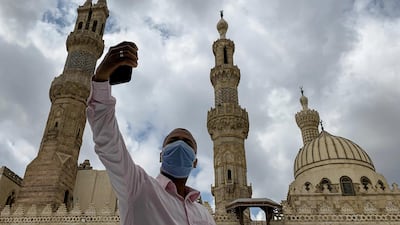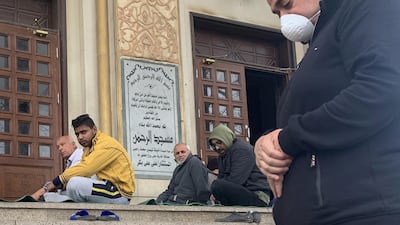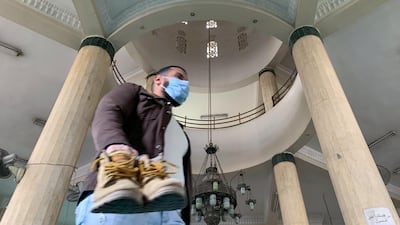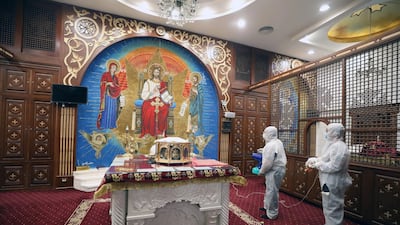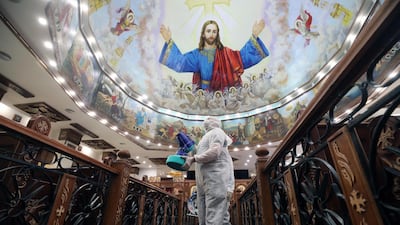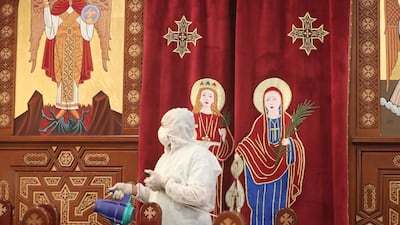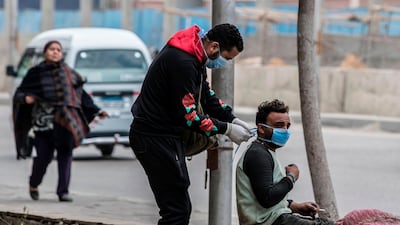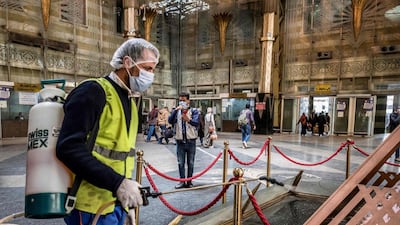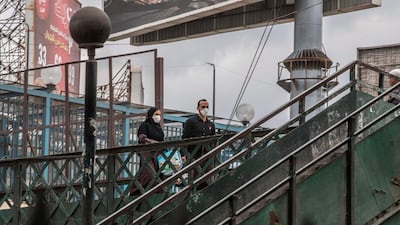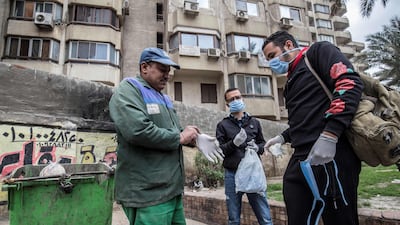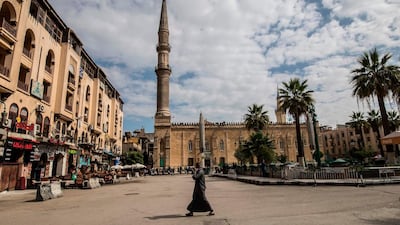Some of the commuters on the Cairo metro wear surgical masks, others wear gloves or just cover their mouth and nose with a handkerchief. There may be a hint of social distancing too, but it’s just that, a hint.
Egypt has taken far reaching measures to combat the spread of coronavirus, suspending classes at schools and universities, banning large gatherings, halting international air travel and closing historical sites. To stave off an economic meltdown, the government has also announced a generous stimulus package including tax exemptions, forgiveness of bad loans and a reduction in power charges for industries.
On Saturday, authorities decided to close mosques for two weeks, with the call for the daily five prayers to include language urging the faithful to pray at home. The decision was announced shortly after the Coptic Orthodox Church, the dominant denomination among Egypt’s estimated 10 million Christians, said it was cancelling all services and that only close relatives would be allowed to attend marriage ceremonies.
President Abdel Fatah El Sisi on Saturday appointed an adviser for health and preventive medicine. The appointment of Mohammed Awad Tagedeen, a career academic and a former health minister, reflected the government’s concern over the outbreak of coronavirus and its resolve to contain it.
The only measure setting Egypt apart from the approach taken by western European nations currently struggling to contain the deadly virus is imposing lockdown on its 100 million people.
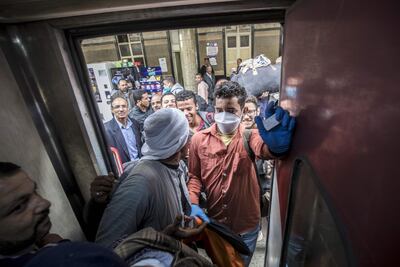
Although authorities have not given a reason for their decision, the view shared among Egyptians is that while the economy was certain to be battered by the coronavirus outbreak, a complete lockdown would likely lead to an acute crisis at a time when the country was just starting to recover after years of political and economic turmoil that followed a 2011 popular uprising.
Not to order a lockdown could be a gamble, especially in the capital Cairo, a sprawling, Nile-side city of 20 million people.
Trains on the Cairo metro, which ferry more than three million commuters every day, are usually packed like cans of sardines during workday rush hour, but on Saturday train cars had only a fraction of those numbers. Still, it was mostly business as usual with the only sign of anything untoward being the masks and gloves used by a tiny minority of passengers and policemen. Instructions on how to avoid infection blared out from speakers at some stations, including a call on passengers to keep at least a one-metre distance from each other.
Otherwise, passengers sat shoulder to shoulder, with everyone going casually about their daily routine, chatting away to companions, speaking on their phones or looking out of the windows.
Life was markedly more different on the streets of Cairo on Friday night, a day after authorities ordered restaurants, cafes and malls to close overnight.
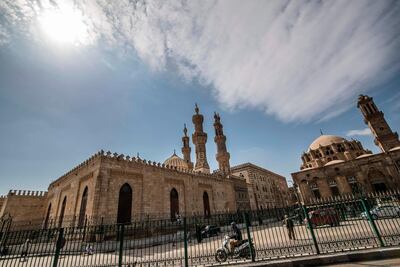
The city had a fraction of its typically busy Friday night traffic. Many streets were dimly lit and much fewer people were on the streets. Many shops were shuttered. The khedival heart of the city had many of its shops closed. With everyone holding on to money in their pockets in anticipation of a lockdown or just a general disruption of normal life, hardly anyone was buying. By 9:30 pm, the streets looked like they normally do well after midnight.
But given the seriousness of the threat posed by the coronavirus, there were still too many people out and about on the streets on Friday night.
The outdoor markets of El Mousqee and Atabah at the heart of Cairo, for example, routinely attract tens of thousands of shoppers on weekend nights. It was nowhere as busy on Friday at the El Mousqee market, but still hundreds were milling around in close proximity looking for bargains among the thousands of garments laid out on rickety stands.
Despite growing cases worldwide, Egypt currently has less than 300 confirmed cases of Covid-19. Eight people have died from the virus. These numbers appear to have influenced the government that the need for a lockdown has not yet arrived.
Authorities fear that a lockdown could cause panic and deepen the predicament of millions of causal workers who eke out an existence on meager daily wages. But all this could change if the number of fatalities and infections surge dramatically.
“The government is taking it step by step to see how well the populace responds,” said one security official. “If people don’t heed the new regulations and continue to treat the matter lightly, then a lockdown will be imposed.”
If that happens, the economic fallout could be virtually incalculable.
Already, a combination of fear and the measures introduced over the past week have taken a toll on the economy.
“I closed my shop today because there was no point in opening for business,” said Mohammed, the co-owner of a clothes store in downtown Cairo.
“On Thursday, one customer walked in and she bought goods worth a 100 pounds. Things are that bad and may be heading to a major crisis,” he added.
A businessman who owns two restaurants and a cafe in an affluent Cairo suburb said he had closed all three outlets after business dropped by 80 per cent since the outbreak of the coronavirus.
“It was not worth it to keep them open. I am still paying wages, but I am also doing overdue maintenance work, allowing workers to clear a backlog of leave and saving on my power and gas bills,” said the owner.
The stock market last week suffered losses in the billions of pounds over fears of the coronavirus. The halt of foreign travel is also certain to cost the treasury billions of dollars in lost revenues. The March 19-31 ban will cost the national carrier, EgyptAir, more than a billion pounds, according to official figures.
